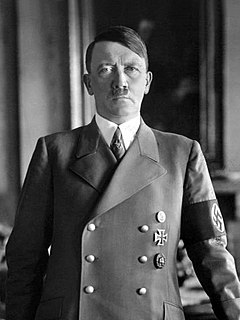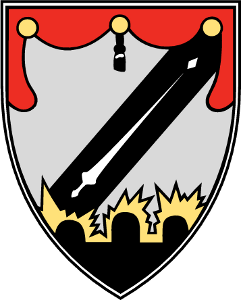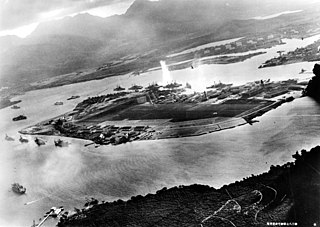
The attack on Pearl Harbor was a surprise military strike by the Imperial Japanese Navy Air Service upon the United States against the naval base at Pearl Harbor in Honolulu, Hawaii on Sunday morning, December 7, 1941. The attack led to the United States' formal entry into World War II the next day. The Japanese military leadership referred to the attack as the Hawaii Operation and Operation AI, and as Operation Z during its planning.
Johann Georg Hiedler was considered the officially accepted paternal grandfather of Adolf Hitler by Nazi Germany. Whether Johann Georg was in fact Hitler's biological paternal grandfather is disputed by modern historians.
The "Winds Code" is a confused military intelligence episode relating to the 1941 attack on Pearl Harbor, especially the advance-knowledge debate claiming that the attack was expected.
John W. Dower is an American author and historian. His 1999 book Embracing Defeat: Japan in the Wake of World War II won the U.S. National Book Award for Nonfiction, the Pulitzer Prize for General Nonfiction, the Bancroft Prize, the Los Angeles Times Book Prize, the Mark Lynton History Prize, and the John K. Fairbank Prize of the American Historical Association.

The Infamy Speech was a speech delivered by United States President Franklin D. Roosevelt to a Joint Session of the US Congress on December 8, 1941, one day after the Empire of Japan's attack on the US naval base at Pearl Harbor, Hawaii, and the Japanese declaration of war on the United States and the British Empire. The name derives from the first line of the speech: Roosevelt describing the previous day as "a date which will live in infamy". The speech is also commonly referred to as the "Pearl Harbor Speech".
Tamotsu Oishi was a career officer in the Imperial Japanese Navy during World War II.
Leon F. Litwack is an American historian whose scholarship focuses on slavery, the Reconstruction Era of the United States, and its aftermath into the 20th century. He won a National Book Award, the Pulitzer Prize for History, and the Francis Parkman Prize for his 1979 book Been In the Storm So Long: The Aftermath of Slavery. He also received a Guggenheim Fellowship.
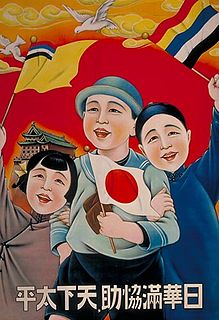
Propaganda in imperial Japan, in the period just before and during World War II, was designed to assist the ruling government of Japan during that time. Many of its elements were continuous with pre-war elements of Shōwa statism, including the principles of kokutai, hakkō ichiu, and bushido. New forms of propaganda were developed to persuade occupied countries of the benefits of the Greater Asia Co-Prosperity Sphere, to undermine American troops' morale, to counteract claims of Japanese atrocities, and to present the war to the Japanese people as victorious. It started with the Second Sino-Japanese War, which merged into World War II. It used a large variety of media to send its messages.
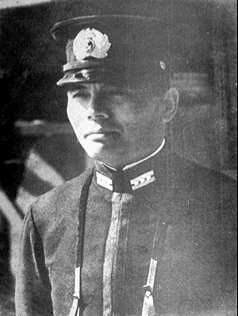
Ryūsaku Yanagimoto was captain of the Sōryū in the Imperial Japanese Navy during World War II.
The Great Pacific War was a 1925 novel by British author Hector Charles Bywater which discussed a hypothetical future war between Japan and the United States. The novel accurately predicted a number of details about the Pacific Campaign of World War II. Bywater was a naval correspondent for the London Daily Telegraph.
Herbert Feis was an American Historian and economist. He was the Economic Advisor for International Affairs to the U.S. Department of State in the Hoover and Roosevelt administrations.
The Hitler family comprises the relatives and ancestors of Adolf Hitler, an Austrian-born German politician and the leader of the National Socialist German Workers' Party, commonly known as the Nazi Party. He was dictator of Germany, holding the titles Chancellor of Germany from 1933 to 1945, and served as head of state as Führer und Reichskanzler from 1934 to 1945. He is noted for his central role in the rise of fascism in Germany, provoking the start of World War II, and the death of millions of people in the Holocaust.

Naokuni Nomura was an admiral in the Imperial Japanese Navy, and briefly served as Navy Minister in the 1940s.

Yoshio Shiga was an officer, ace fighter pilot, and leader in the Imperial Japanese Navy (IJN) during the Second Sino-Japanese War and the Pacific theater of World War II. At the December 1941 Attack on Pearl Harbor, Shiga led one of the aircraft carrier Kaga's fighter divisions during the first strike on American forces on Oahu. The number of his Zero fighter was AII-105. Shiga continued as a fighter division commander on Kaga until April 1942.
David Emanuel Hoffman is an American writer and journalist, a contributing editor to The Washington Post. He won a Pulitzer Prize in 2010 for a book about the legacy of the nuclear arms race.

The Z flag is one of the international maritime signal flags.

The attack on Pearl Harbor has received substantial attention in popular culture in multiple media and cultural formats including film, architecture, memorial statues, non-fiction writing, historical writing, and historical fiction. Today, the USS Arizona Memorial on the island of Oahu honors the dead. Visitors to the memorial reach it via boats from the naval base at Pearl Harbor. The memorial was designed by Alfred Preis, and has a sagging center but strong and vigorous ends, expressing "initial defeat and ultimate victory". It commemorates all lives lost on December 7, 1941.
